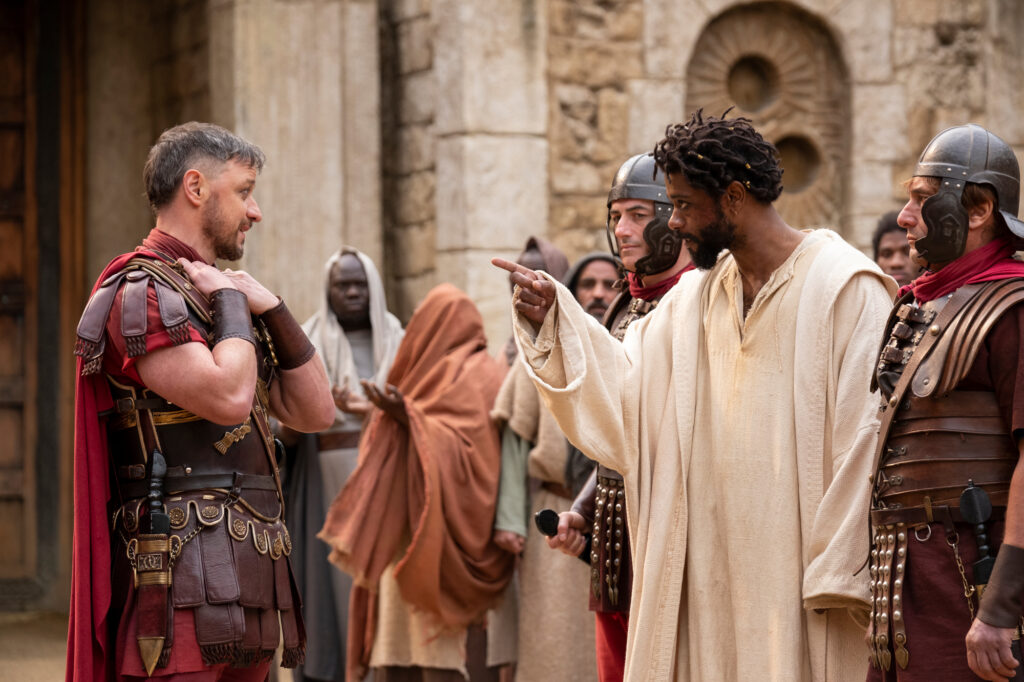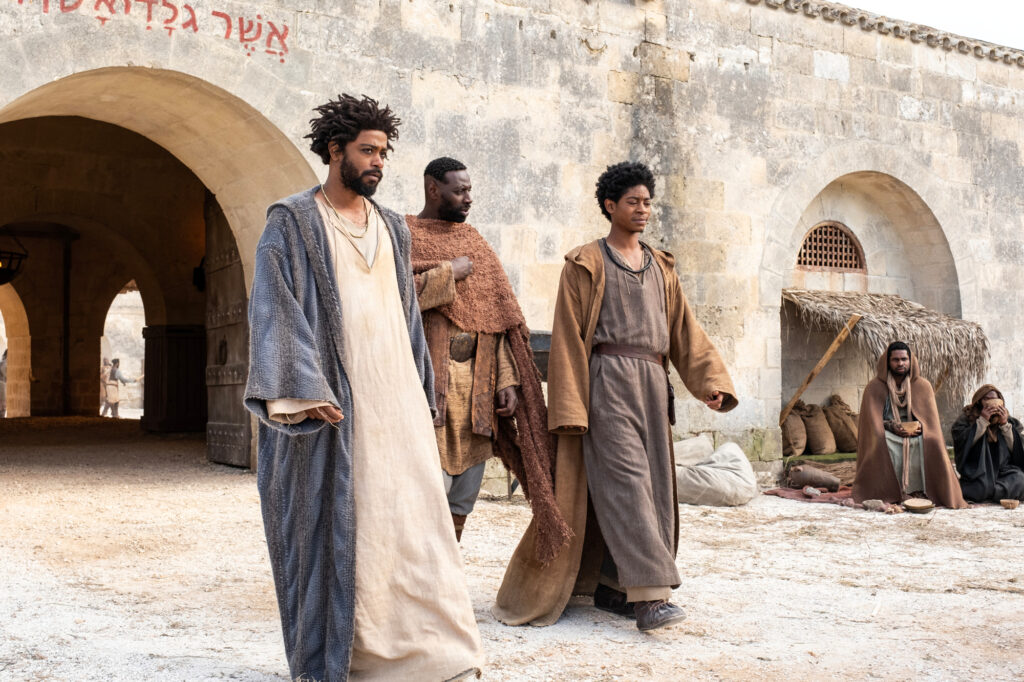Alfre Woodard, Anna Diop, Benedict Cumberbatch, comedy, David Oyelowo, Eric Kofi-Abrefa, James McAvoy, Jeymes Samuel, LaKeith Stanfield, Marianne Jean-Baptiste, Micheal Ward, movies, Omar Sy, reviews, RJ Cyler, Teyana Taylor, The Book of Clarence, Tom Glynn-Carney
January 13, 2024
by Carla Hay

Directed by Jeymes Samuel
Culture Representation: Taking place in 33 .A.D., in an alternate version of Jerusalem, the comedy film “The Book of Clarence” features a predominantly black cast of characters (with some white people) representing the working-class, middle-class and wealthy.
Culture Clash: An atheist rogue, who is heavily in debt, pretends to a miracle worker to con people out of money, much to the chagrin of his identical twin brother, who is a follower of Jesus Christ.
Culture Audience: “The Book of Clarence” will appeal primarily to fans of the movie’s headliners and people expecting a witty satire of Christianity and racism, but they won’t get much wit in this movie.

“The Book of Clarence” is writer/director Jeymes Samuel’s attempt to make a religious satire like classics from Monty Python or Mel Brooks. But it’s a muddled mess where the best jokes aren’t very amusing. A talented cast cannot save this dull flop. “The Book of Clarence” also lazily panders to unnecessary negative and over-used stereotypes that do nothing substantial for the story.
The best religious satires are those where audience members don’t have to know much about religion to enjoy the satire, because the story and the characters speak to larger issues about humanity and social structures. That’s one of the failings of “The Book of Clarence,” which relies too heavily on comedy where viewers need to have better-than-average knowledge of Judeo-Christian teachings to understand some of these movie’s intended messages.
Another big problem with “The Book of Clarence” is that it goes back and forth between lampooning Christianity and skewering racial oppression of black people, but the movie often loses focus and ends up not saying much at all. There are chase scenes in the movie that are meaningless. Major characters from the Bible are reduced to making shallow appearances, when their characters could have been developed in an impactful way.
In “The Book of Clarence” (which takes place in 33 A.D. in Jerusalem), Clarence (played by LaKeith Stanfield) is an unemployed loser who doesn’t do much with his life but commit petty theft, gamble, and sell and smoke marijuana with his best friend Elijah (played by RJ Cyler), who is a stereotypical stoner sidekick. Black men who use drugs and are involved in criminal activities? What a stupid, unoriginal and overused stereotype in movies.
The movie opens by showing several men in with their hands and feet nailed to crucifixes. Clarence is one of the men. A man who looks like the usual portrayal of Jesus Christ is another one. “The Book of Clarence” circles back to this scene toward the end of the movie, after it’s been shown how Clarence ended up on this crucifix. It’s a long and disjointed slog to get to that point, filled with cringeworthy dialogue and unfunny “jokes” that make everyone look like idiots.
In one of the movie’s early scenes Clarence and Elijah are in a chariot, and they are racing against Mary Magdalene (played by Teyana Taylor) in another chariot. Clarence and Elijah both get shot with darts and fall out of their chariots. Mary Magdalene then races off and isn’t seen again until after a long time-wasting stretch of the movie. It’s an example of some of many pointless scenes in “The Book of Clarence.”
Clarence is heavily in debt to a local thug named Jedediah the Terrible (played by Eric Kofi-Abrefa), who has given Clarence a deadline of 30 days to pay his debt. Meanwhile, atheist Clarence is bothered by the fact that his estranged identical twin Thomas (also played by Stanfield) has become a follower of a self-proclaimed Son of God named Jesus Christ (played by Nicholas Pinnock), who has amassed a growing number of followers but also detractors. Jesus keeps his face hidden under a hood until a “face reveal” that’s supposed to be suspenseful but is anti-climactic.
Clarence still lives with his loving and compassionate mother Amina (played by Marianne Jean-Baptiste), because he is too financially broke to afford his own place. Amina is heartbroken that her only children are feuding with each other. Meanwhile, Clarence is dealing with his own heartbreak issues, because he’s pining for a beautiful woman named Varinia (played by Anna Diop), whom Clarence thinks is out of his league. Varinia also happens to be the sister of Jedediah.
Roman Empire officials are the story’s racist oppressors in “The Book of Clarence,” which has scenes that are obvious parallels to how racist modern-day police treat black men. Clarence and Elijah are minding their own business on a street when they get stopped and harassed by Roman law enforcement saying that Clarence and Elijah “fit the description” of two wanted criminals. Clarence and Elijah have multiple run-ins with a sadistic Roman named Decimus (played by Tom Glynn-Carney), who takes pleasure in targeting people who aren’t white.
When he’s not being racially profiled by white Romans, Clarence is being hunted by Jedediah and his goons, with Elijah as his drug-addled wing man. Clarence thinks up a scheme to get the money that he owes to Jedidiah: He pretends to be a Jesus disciple who can perform miracles, in order to con people out of money. “The Book of Clarence” is basically a ripoff of the 1995 stoner comedy “Friday” (starring Ice Cube and Chris Tucker), wrapped in the guise of a religious satire.
John the Baptist (played by David Oyelowo) sees through Clarence’s fake religiousness when Clarence asks John to baptize him. Other characters in the movie that are based on biblical characters are the Virgin Mary (played by Alfre Woodard); Judas Iscariot (played by Micheal Ward); Barabbas (played by Omar Sy); and Pontius Pilate (played by James McAvoy). One of the few white people in the movie who isn’t portrayed as evil is Benjamin (played by Benedict Cumberbatch), a dirty homeless beggar, who gets a makeover that is supposed to be a symbol of “whitewashed” rewriting of history.
“The Book of Clarence” isn’t a cohesive story. It’s just a bunch of poorly conceived sketches that are strung together with bibilical references. Many of the plot developments go nowhere. The acting performances are mostly mediocre or just plain awful. Clarence’s relationships, such as those with his twin Thomas and his would-be love interest Varinia, are boring and hollow, when they should be among the most interesting aspects of the story. Here’s an example of the movie’s moronic dialogue: Clarence says to Varinia: “I am spirit over sandals in love with you.”
The movie is capable of maybe eliciting some mild chuckles from viewers, but mostly the plot just goes around in circles, and then tries to wrap things up in a sentimental way that is unearned and phony, considering how cutting-edge this comedy want to be. Worst of all, “The Book of Clarence” is pretending to be a provocative and clever satire, when it’s really just a witless stoner movie. In that sense, this disappointing dud is just like the movie’s namesake Clarence: a sham wanting more respect and glory than what is deserved.
TriStar Pictures released “The Book of Clarence” in U.S. cinemas on January 12, 2024.
